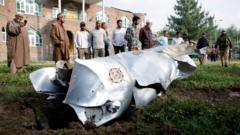Increased violence has erupted between India and Pakistan following deadly clashes in Kashmir, with significant military movements, drone attacks, and civilian casualties raising concerns over the potential for all-out war. Amid high-stakes diplomatic discussions, fears are mounting over the impact on regional stability and civilian safety.
India-Pakistan Tensions Escalate Amid Unprecedented Military Action

India-Pakistan Tensions Escalate Amid Unprecedented Military Action
The ongoing military conflict between India and Pakistan has reached alarming levels, as both countries engage in extensive strikes beyond the contested Kashmir border.
---
The military confrontation between India and Pakistan has intensified, with recent developments marking the most sweeping military engagement between the two neighboring countries in decades. As reports surface of extensive attacks that extend far beyond the long-disputed Kashmir border, both nations have mobilized military assets in a bid to assert dominance in the ongoing conflict.
The tensions flared after a terrorist attack two weeks ago in Kashmir left 26 people dead, predominantly targeting Hindu tourists. In response, India launched airstrikes against alleged militant positions in Pakistan, prompting reprisals and escalating exchanges of fire across the Line of Control (LoC), which divides the two countries.
Eyewitness accounts reveal extensive damage and civil unrest in both nations as shelling and drone operations disrupt lives. In Kashmir, both Indian and Pakistani civilians report destruction, prompting evacuations and heightened anxiety over escalated military actions. Reports indicate multiple civilian casualties on both sides, with the Indian military asserting operational successes against drone strikes initiated by their Pakistani counterparts, claims that have been flatly denied by the Pakistani government.
The use of advanced military technology such as drones is a notable shift in this resurgence of conflict, dramatically altering engagement strategies compared to historical confrontations. Analysis of the aftermath indicates a surge in disinformation, complicating the situation further, as overlapping claims contribute to public uncertainty.
Meanwhile, attempts at diplomatic resolution signal potential paths forward but face significant hurdles given the animosity that has cultivated over decades of conflict. Pakistani leadership has engaged proactively with regional allies like Saudi Arabia and Qatar to negotiate de-escalation, yet the reality on the ground shows little sign of abating hostility.
Many in both nations express deep concern about the implications of a prolonged conflict, including economic repercussions mirrored in falling stock markets and impacts on borders, travel, and safety norms amidst a militarily charged atmosphere.
Efforts to stave off further escalation will remain critical as leaders from both nations navigate a fraught landscape marked by history, nationalism, and the specter of warfare.
The military confrontation between India and Pakistan has intensified, with recent developments marking the most sweeping military engagement between the two neighboring countries in decades. As reports surface of extensive attacks that extend far beyond the long-disputed Kashmir border, both nations have mobilized military assets in a bid to assert dominance in the ongoing conflict.
The tensions flared after a terrorist attack two weeks ago in Kashmir left 26 people dead, predominantly targeting Hindu tourists. In response, India launched airstrikes against alleged militant positions in Pakistan, prompting reprisals and escalating exchanges of fire across the Line of Control (LoC), which divides the two countries.
Eyewitness accounts reveal extensive damage and civil unrest in both nations as shelling and drone operations disrupt lives. In Kashmir, both Indian and Pakistani civilians report destruction, prompting evacuations and heightened anxiety over escalated military actions. Reports indicate multiple civilian casualties on both sides, with the Indian military asserting operational successes against drone strikes initiated by their Pakistani counterparts, claims that have been flatly denied by the Pakistani government.
The use of advanced military technology such as drones is a notable shift in this resurgence of conflict, dramatically altering engagement strategies compared to historical confrontations. Analysis of the aftermath indicates a surge in disinformation, complicating the situation further, as overlapping claims contribute to public uncertainty.
Meanwhile, attempts at diplomatic resolution signal potential paths forward but face significant hurdles given the animosity that has cultivated over decades of conflict. Pakistani leadership has engaged proactively with regional allies like Saudi Arabia and Qatar to negotiate de-escalation, yet the reality on the ground shows little sign of abating hostility.
Many in both nations express deep concern about the implications of a prolonged conflict, including economic repercussions mirrored in falling stock markets and impacts on borders, travel, and safety norms amidst a militarily charged atmosphere.
Efforts to stave off further escalation will remain critical as leaders from both nations navigate a fraught landscape marked by history, nationalism, and the specter of warfare.


















